Are guinea pigs the right pet for you?
Absolutely! Guinea pigs are lovable animals that anyone would love to have as a pet. They make great companions, and they are not violent creatures and are also easy to look after. But before you get a guinea pig, there are some facts and crucial information you need to know.
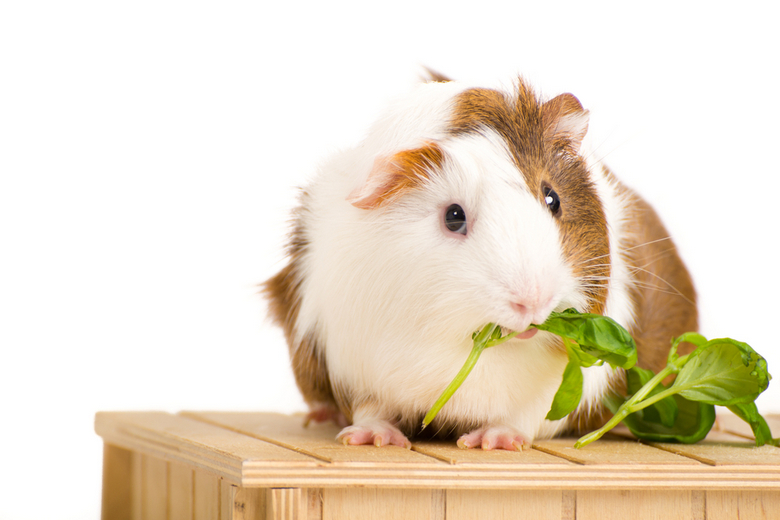
Guinea Pig Facts
Despite them being called guinea pigs, they neither originate from Guinea nor are they actually pigs. Guinea pigs rather are rodents that originate from a place known as Los Andes in South America. They are called pigs because they produce grunting noises similar to a pig’s and they also have physical characteristics similar to pigs such as big heads disproportionate to their bodies.
The scientific name of the guinea pig is Caviaporcellus. Most pet owners will probably want to choose a name for their guinea pig. However, they are named differently in different parts of the world and the most common include:
- Guinea pig/cavy – North America, Europe, and Australia
- Cuy (Spanish) – Ecuador, Peru, and Bolivia
- Conejillo de Indias (Spanish) – Spanish America
An ordinary guinea pig weighs between 1.6 and 2.6oz and measures between 20 and 25cm in length. Guinea pigs are mostly fluffy, but there also exist hairless ones. They also come in different colors depending on the breed. Guinea pigs are also very social and prefer to be in the company of their kind to be happy, as they can groom each other and mate.
Like other rodent species, guinea pigs are herbivores, and therefore, they feed on grass, hay, as well as fresh fruits and vegetables. They have dichromatic color vision meaning they are only able to see one or two colors and also share certain biological similarities with humans. Like us, they are unable to make their own vitamin C, and this has made them ideal in medical research in the creation of pharmaceuticals which has, in turn, saved many lives.
Pros and Cons of Keeping Guinea Pigs
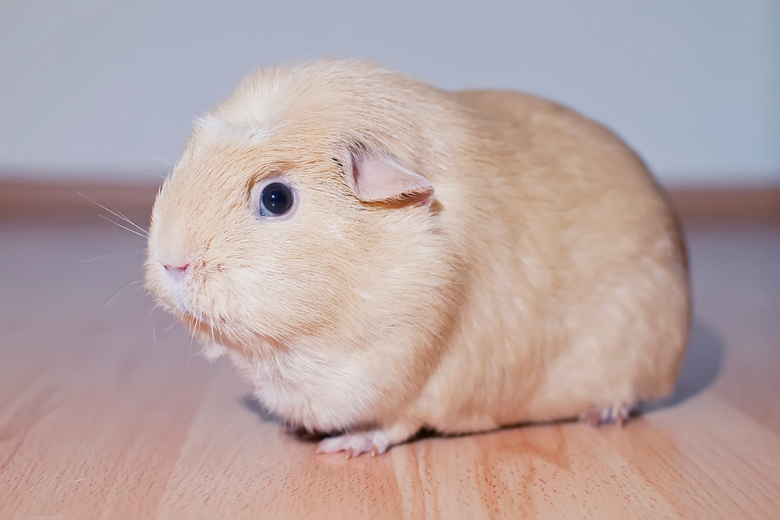
Like with any other pet there is the good and the bad in keeping a guinea pig. You will not have a smooth ride, but it shouldn’t be too hard for you to deal with these challenges, and it definitely shouldn’t stop you from getting these adorable little creatures.
Pros
- Less susceptible to diseases
- Great companions
- Easy to care for
- Fairly long lifespan
- They are not violent
- Cute
Cons
- Require a lot of space
- Shy creatures
- Should be kept in groups of two or more for them to be happy
Guinea Pig Breeds
Guinea pigs exist in so many breeds, and this will determine the appearance of the guinea pig. Regardless of the breed, however, guinea pigs possess similar behaviors and biological characteristics. There are also common as well as exotic guinea pigs, and some guinea pigs need more care and grooming than others depending on the length and type of hair and coat that covers their body. They include the magpie, baldwin, texel, silkie and so many more.
Guinea Pig Cages
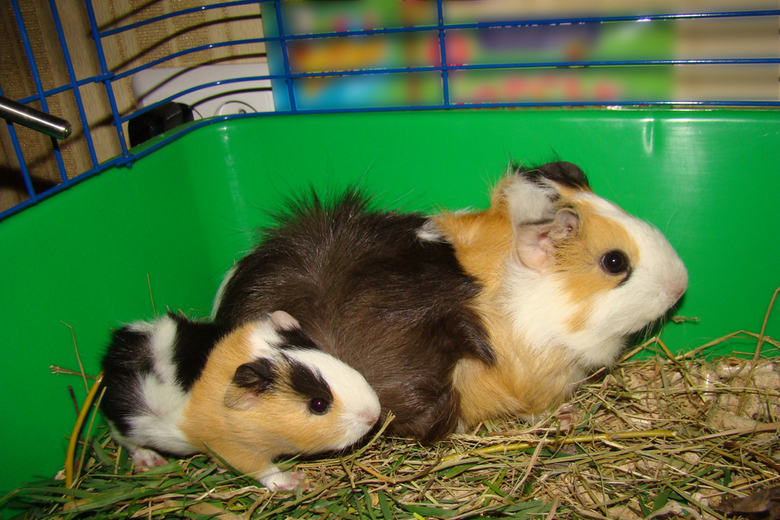
Guinea pigs do not require a lot, but there are a few requirements you have to meet when picking a cage for your pet to ensure that they are comfortable. Guinea pigs need roomy cages that will allow them to roam around freely and comfortably. Getting the right sized cage enriches your pet’s life and prevents medical conditions while also promoting peaceful coexistence with its companion(s).
Guinea pigs also need a lot of floor space for exercise and play since they are not great climbers. Cages that have elevated areas should have ramps that are not steep to allow your guinea pig to climb. Your pet needs to be as comfortable as possible, and therefore the cage should have a solid bottom even before you choose the bedding. This will help to prevent your pet’s delicate feet from becoming swollen and infected due to the uneven bumps of the mesh flooring. The cage needs to be highly accessible with big openings to allow it to be cleaned easily. It is best to get a cage with a solid base as this prevents a build-up of waste. Accessibility also provides interaction with your pet as well as feeding it without having to get it out of the cage. Balconies and hidey houses also allow your pet to have a better view as well as creating a hiding nook for your pet when it needs privacy.
Guinea Pig Toys
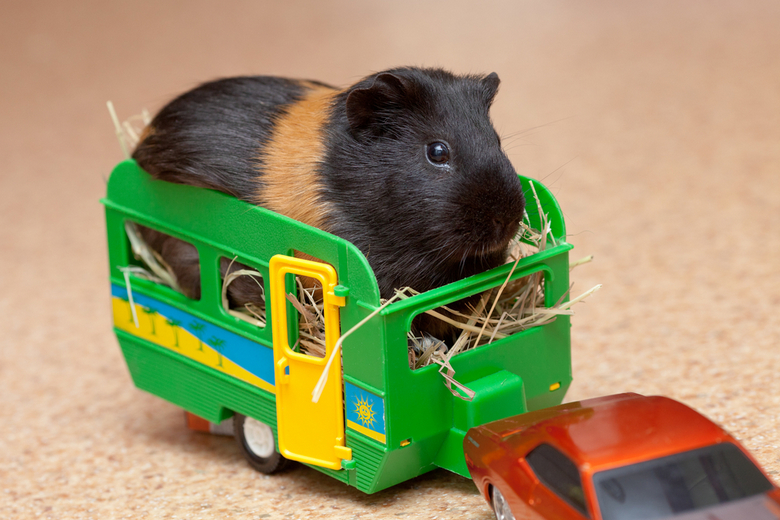
Guinea pigs are very active pets that need to be continuously stimulated and entertained. There are a lot of guinea pig toys in the market, some of which your pet will love and others which it will have no interest in. You need to be very careful about the toys you get your pet as some can be dangerous or harmful to your pig. It is not a must that you buy your guinea pig a toy from the market as you can easily make some of them at home. They toys best suited for your guinea pig include exercise balls and wheels, play toys, tunnels and tubes, chews and nibblers, and ramps and stairs. You should avoid cramming these toys inside your pet’s cage to give it space to roam around freely. The toys also need to be cleaned frequently to get rid of germs that may have accumulated in the toys and also to prevent a build-up of germs.
Guinea Pig Sounds and Noises
Guinea pigs are noisy pets that make different sounds. As an owner, it is crucial to understand the sounds that your pet makes while also observing its behavior to be aware of its wellbeing. These sounds include wheeking, purring, rumble, growling, whining, and more and they may signify whether your pet is happy, sad, angry or sick. Once you are aware of the different sounds your pet produces and what they mean, you will be able to take care of your pet better.
Guinea Pig Bedding
Guinea pigs need to have bedding made from soft, cozy and highly absorbent material since they spend most of their time in their cages. The bedding should also produce little odor and not harm your pet. The best options for guinea pig bedding include paper bedding, fleece bedding, and aspen bedding. Each of the bedding has its own advantages and disadvantages. One might be highly absorbent but poses a risk to your pet as it might ingest the bedding, while another might be super soft and comfortable but lacks the ability to absorb and control the odor emitted by the guinea pig’s urine and droppings. You can, therefore, choose one that you think will work best for both you and your pet.
Guinea Pig Food and Diet
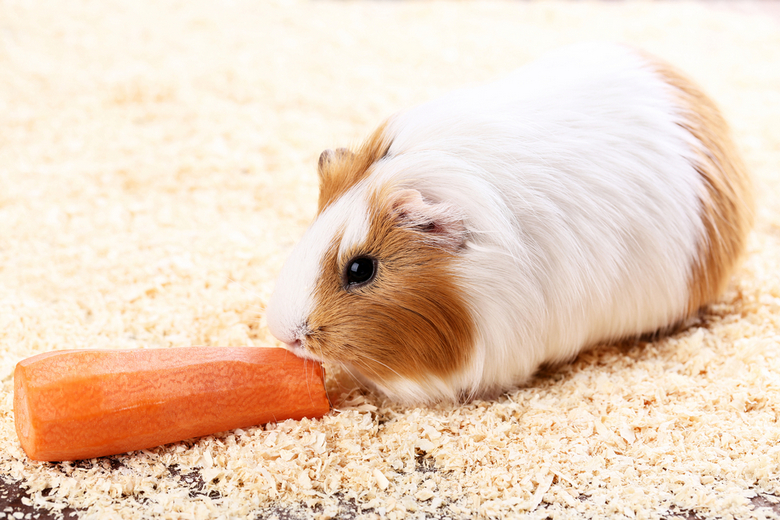
Guinea pigs are herbivores, and they, therefore, need to be fed high-quality guinea pig hay and pelleted guinea pig food. You should also provide limited amounts of fruits and vegetables to promote a balanced diet. Like people, guinea pigs are not able to manufacture their own vitamin C, and therefore this should be the main ingredient in your pet’s diet. There are various tips you should follow when feeding your guinea pigs which include introducing the new food gradually, feeding them on a consistent schedule, getting rid of food, fruits, and vegetables that haven’t been eaten, and ensuring that the cage is clean before adding new food. Treats should be fed on occasions, and this should not exceed 10% of your pet’s diet. Treats also help to provide your pet with something to chew on since guinea pig teeth grow continuously throughout their life. You may even get chewy toys for the teeth and to also help relieve boredom.
When it comes to providing water for your pet, you should ensure that your pet’s water is fresh, filtered and chlorine free. The water should be available at all times more so during warm weather to prevent your pet from suffering a heat stroke. The water bottle should be rinsed daily and washed with hot water and a bottle brush once a week to avoid build-up of dirt.
Guinea Pig Bites
Guinea pigs rarely bite so when they do, there are several reasons behind it. It might do so when trying to communicate something to you when it becomes irritated, it feels uncomfortable, it is afraid, when it is noisy, and more. Guinea pigs may also bite each other when there is more than one in a cage. It is normal but not too frequent. Guinea pig bites are not dangerous, and you shouldn’t worry too much if your pet bites.
Guinea Pig Lifespan
The lifespan of guinea pigs depends on several factors including the breed, diet, and medical treatment. Guinea pigs usually live between five to seven years although some may live as long as 10 to 14 years. Guinea pigs have a reasonably long lifespan compared to other small pets such as hamsters.
Conclusion
Before you get a guinea pig, you need to have enough knowledge about these lovely creatures and be sure that you are ready to take care of them. This will help you go for the breed you feel you're capable of handling to avoid inconveniences for both you and the guinea pig.